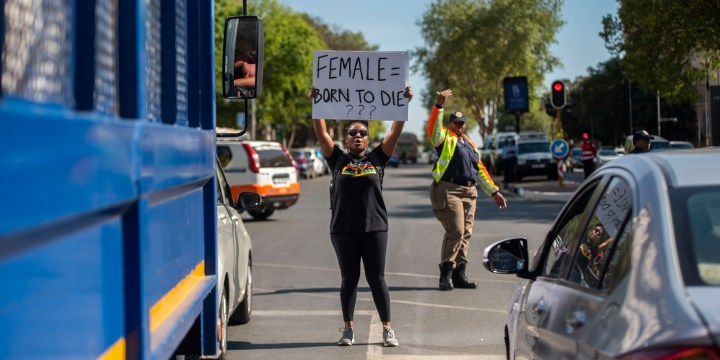OP-ED
We must not forget about sexual and gender-based violence

What makes sexual and gender-based violence committed in South Africa particularly disturbing is that the stats are among the highest among states not in the throes of armed conflict.
Following the euphoria of the Springboks winning the 2019 Rugby World Cup, the words of the Speaker of the National Assembly, Thandi Modise, were chilling. During the Springboks’ visit to the National Assembly last week, the Speaker welcomed them by stating that their victory made South Africans “forget gender-based violence”.
These words were uttered in the same week that the rapist and murderer of Uyinene Mrwetyana was sentenced to three terms of life imprisonment plus five years. It was Uyinene’s brutal death in August 2019 that saw an upsurge in public furore over rates of sexual and gender-based violence (SGBV) in South Africa, and demands that the government take concrete action against the scourge.
Such demands have long been made by civil society movements such as Stop Gender Violence: A National Campaign and The Total Shutdown: Intersectional Womin’s Movement Against GBV. The former was established in 2014 and is a national coalition of civil society organisations working together to end gender-based violence. It presented the government with a shadow “National Strategic Plan” framework report to assist it in its response to SGBV. The Total Shutdown Movement has since 2018 mobilised marches across South Africa and submitted a memorandum to President Cyril Ramaphosa.
The government’s response to these calls to action has been alarmingly slow and confusing, to say the least. In response to the Total Shutdown memorandum, the government convened a national summit on gender-based violence and femicide in 2018. An interim steering committee on gender-based violence and femicide was established, and a national multi-sector council was mandated to coordinate and draft a National Strategic Plan on Gender-Based Violence and Femicide. The draft National Strategic Plan 2020–2030 was, however, only released in August 2019, despite there being the building blocks in the shadow plan.
It was only on 18 September 2019 that President Cyril Ramaphosa called a special joint sitting of the National Assembly and National Council of Provinces on SGBV after the public uproar in August. The president announced implementation within six months of a multi-disciplinary Emergency Action Plan to combat SGBV. This has five intervention areas, namely implementation of prevention measures, strengthening of the criminal justice system, enhancing the legal and policy framework, ensuring adequate care, support and healing for victims of violence, and, lastly, improving the economic power of women.
An undertaking to allocate a budget of R1.1-billion to the emergency plan was made. The Emergency Action Plan is to be driven by (another) interim steering committee on gender-based violence and femicide, this time located in the Presidency, co-chaired by government and civil society organisations.
Both the interim steering committee on gender-based violence and the emergency action plan identified that a gender-based violence and femicide fund be established for rapid response to assist survivors, and that law enforcement authorities must be trained to approach SGBV from a survivor-centric point of view.
Yet, these responses raise a number of questions. Are these measures going to ensure justice for victims and survivors of SGBV? Will the fund make provision for reparation, in particular in the form of restitution, compensation and satisfaction? What measures are being put in place that will adequately address the culture of denial and social stigma attached to SGBV?
Putting South Africa in the global context, notwithstanding extensive international condemnation of SGBV as international crimes, calls for accountability of the perpetrators, and the international obligation to ensure justice for all its victims, the commission of these horrific crimes is continuing unabated and with near-impunity globally.
The gross human rights violation does not only occur during situations of armed conflict, but also in times of peace. What makes SGBV committed in South Africa particularly disturbing is that the statistics are among the highest in states not currently in the throes of armed conflict.
At an international criminal and human rights law level, SGBV falls within the category of the “most serious crimes” of concern to the international community and can amount to genocide, crimes against humanity, and war crimes.
In a 2014 policy paper, the Office of the Prosecutor of the International Criminal Court recognised that investigation and prosecution of SGBV is a priority of the court and, where sufficient evidence exists, it can be charged explicitly as an international crime per se. What this would mean in relation to the alarming rates of SGBV in South Africa is yet to be determined.
Our own president echoed this by describing our country as one of the “most unsafe places in the world to be a woman, with levels of violence that are comparable to countries that are at war”.
We must remind ourselves to never forget the dark shadow of SGBV that hangs over South Africa, even in the midst of celebrations and the happiest of times. Going forward, the only solution is to make the combatting SGBV, especially in South Africa, an issue of both national and international importance.
It is against this backdrop that the South African Institute for Advanced Constitutional, Public, Human Rights and International Law (SAIFAC), a centre of the University of Johannesburg, will be hosting a two-day multi-disciplinary conference, International Law and Justice for Victims of the Gross Human Rights Violation of Sexual and Gender-based Violence. DM
Dr Mispa Roux is head of the Sexual and Gender-Based Violence Unit at SAIFAC. Nabeelah Mia is a researcher at SAIFAC.




















 Become an Insider
Become an Insider